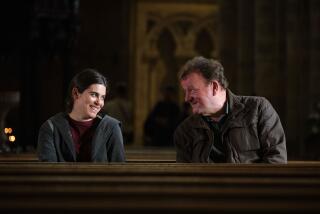Ken Loach’s political ‘I, Daniel Blake’ debuts at New York Film Festival at a critical national moment
The honor and struggle of the working class are a staple of auteur cinema — in modern days, via some of the works of the Dardenne brothers and Mike Leigh and, in earlier times, with classics such as “The Bicycle Thief.”
But few directors do neorealism like Ken Loach. And few Loach movies arrive at a more propitious moment than the British director’s latest, “I, Daniel Blake.”
The surprising (to some critics, really surprising) recipient of this year’s Palme d’Or at the Cannes Film Festival, “Blake” made its U.S. premiere at the New York Film Festival on Saturday ahead of its American release in December. It comes as income inequality has factored into a presidential election cycle and driven various forms of populism across Europe.
“Here we are, the fifth-richest economy in the world, and you [see] people choosing between heat and food,” screenwriter and longtime Loach collaborator Paul Laverty said of his native Britain, explaining the film’s origins at the premiere. “What we wanted to do was tell a story that was almost elemental, almost raw.”
See the most-read stories in Entertainment this hour »
“I, Daniel Blake” follows its title character (Dave Johns), a carpenter somewhere between good-natured and curmudgeonly, who after suffering a heart attack is told he can’t work again.
This would seem like not much of a personal crisis in a country with a relatively strong social safety net. But Daniel is just fit enough to work — says an ominously named “decision-maker” at the welfare office — that he can’t collect disability. And he’s not nearly looking hard enough for that work, says another decision-maker, to garner unemployment. So he’s left to navigate a maze that’s as Kafka-esque as it is unfair.
As this unfolds, Daniel, a 60-ish widower with no children, meets a young single mother named Katie (Hayley Squires), befriending her and her two kids. Katie faces similar unfairness as Daniel. She also has the same tough skin and gentle spirit as he does, and the two bond.
If the lines here can be a little too sharply drawn — nearly everyone in the system is bad, and all the everyday people pure and hardy — the movie sells the idea with deep wellsprings of humanity and sparkling performances. Johns offers heart without sap in the title role. But the film’s standout may be Squires, a previously unknown 28-year-old who in interviews has spoken about her own hardscrabble upbringing. Several scenes are minor-key dramatic showstoppers, not least one at a food bank involving Squires.
The actress said such scenes were effective in part due to Loach’s decision to shoot chronologically. By giving out the script to actors only in sections, they didn’t have the burden of knowing that in 10 or 15 days, they would have to get to a particular place emotionally.
Loach, at 80 and awaiting surgery, did not make the long flight from his native England for the New York festival. (More perplexingly absent was Johns, a veteran comic who shows new dramatic chops in the film.)
Among other purposes, the New York Film Festival is a gathering of second chances. The festival screens a number of Cannes movies, but without that gathering’s instant and at times herd-like reactions. Certainly some ambivalent Cannes veterans — steeped in Loach films with similar themes over the years — may be inclined to take a fresher look. That said, a commercial breakout could be tough for distributor IFC; most of Loach’s films are niche art-house pieces.
This one does bring the seal of the director’s second Palme. Opening on the heels of an economics- and class-minded U.S. election could help give it further traction. “Blake” is, at heart, an indictment of a bureaucracy that is at best unfeeling and at worst actively oppressing the poor with cutbacks in social-welfare programs.
Laverty was not shy about this. He referred to a “targeting of the weakest members of society.” Nor was he reticent about what he sees as the politics undergirding the issue. He called out politicians who declare war on immigrants as well as companies that he said skirt tax obligations, noting they were “a dagger in the heart of civility.”
“It’s a political decision to let them get away with it, and there’s a great duty to organize and inform ourselves so those bastards don’t get away with it,” he said.
The audience responded enthusiastically to this call to arms. The movie, though, doesn’t make as overt a claim, coming somewhat close only with a speech about Daniel’s virtue. Laverty said that the real people who had similarly been let down by the system were “gobsmacked to see their story on screen.” The movie, quietly and narratively, seeks to honor their feelings.
On Twitter: @ZeitchikLAT
More to Read
Only good movies
Get the Indie Focus newsletter, Mark Olsen's weekly guide to the world of cinema.
You may occasionally receive promotional content from the Los Angeles Times.







